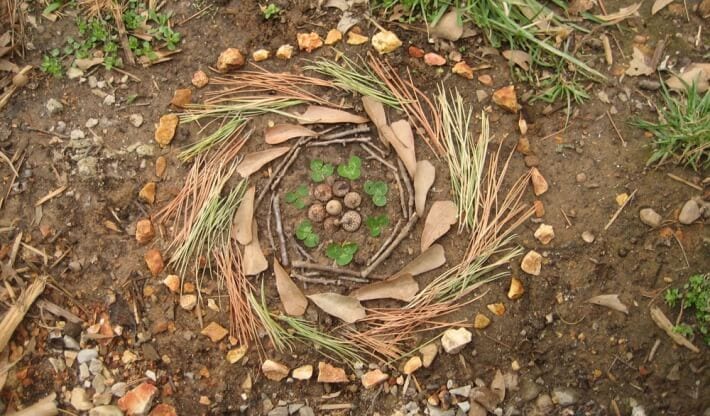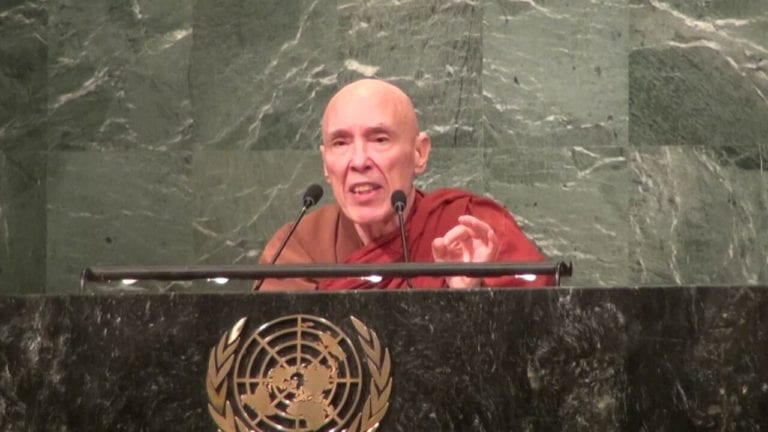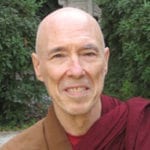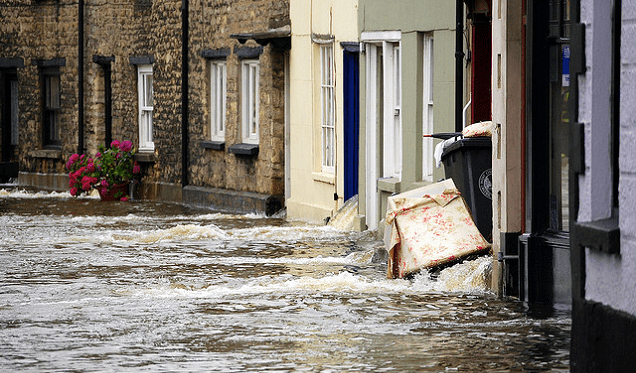Buddhism teaches that personal practice and safeguarding our environment are closely connected. This is because both of these endeavors ask us to overcome the forces of greed, hate, and delusion. The intimate relationship between the world and ourselves means that when we properly care for ourselves we will care for the world, and when we do what’s best for the world, we benefit ourselves.
After his awakening, which took place as he sat outdoors underneath a tree, the Buddha continued to live and meditate in forests throughout his life. He explained that he did this for his own benefit and out of compassion for future generations. Because nature is a tremendous support for the path of liberation, the Buddha instructed his followers to meditate in nature.
Practicing mindfulness outdoors in nature cultivates a greater appreciation of the natural world. Building on this appreciation, a healthy respect for nature can come from understanding how dependent our lives are on the natural environment and how easily human activity can damage this support system. When the Buddha was alive, human impact on the natural world was evident mainly on a small, local scale. Today, the evidence of this interconnectedness is global—for instance, the greenhouse gases released through human activity in some parts of the world affect climates across the planet.
There’s an ancient Buddhist tale that tells of a mythic tree whose vast canopy provides shade and whose abundant fruit can be harvested freely by anyone. But when a greedy person stuffs himself with fruit and then breaks off one of the branches, the tree stops bearing fruit.
As practitioners on this path, it doesn’t make sense to ignore what we can personally do by relying on others to take responsibility for our environment. Instead we view our own actions as significant.
Another early Buddhist myth depicts an ideal world of abundance and ease that progressively falls into decay in response to the deteriorating ethics of the people who live there. The decline begins as people become greedy and continues with the gradual appearance of arrogance, lust, laziness, theft, lying, and violence.
These ancient myths no longer feel fanciful—they quite accurately represent our modern world. Rainforests have been clear-cut and the land can no longer support people living there. In some parts of the world the soil and water have become polluted with pesticides, herbicides, and other chemicals, sickening nearby residents. The air in metropolitan areas is filled with smog, and children who breathe this pollution have higher rates of asthma and autism.
If we look closely, we can see that greed, hate, or delusion underlies all large scale human destruction of the environment. Greed drives exploitation of our natural resources, hate destroys vast lands through the ravages of war, and delusion perpetuates environmental harm when we don’t understand the impact our actions have on the natural world.
Of these forces, delusion (and its partner, indifference) is perhaps the most widespread and thus the most destructive. Even those of us with the best intentions can be blind to the effects our actions have, especially when the repercussions are out of sight, removed in space or time. For instance, large dams built in order to improve people’s lives have destroyed the watershed that sustained the very communities they were meant to serve. Cutting trees in the Himalayas in order to care for one’s family can have disastrous consequences when hundreds of thousands of people do the same thing. When farmers in Sumatra set fires to clear land, they neither know nor care much about the record air pollution that falls on Singapore as a result. One person thinks that his or her driving contributes a negligible amount of pollution, without considering what happens when that contribution is combined with the millions of cars driving in the same region. In the California Bay Area, for example, the smog from its 5 million cars kills trees in the Sierra Mountains, far out of sight of Bay Area residents.
Contributing to the well-being of all of life can give joy and provide deeper meaning to our actions.
Buddhism emphasizes the impact our individual actions have on our lives and the world around us, and it follows from this perspective that caring for the natural world begins with each of us. As practitioners on this path, it doesn’t make sense to ignore what we can personally do by relying on others to take responsibility for our environment. Instead we view our own actions as significant. Because of the staggering number of people now living on the earth—7 billion—the combined actions of many can either preserve vast ecosystems, or destroy them. If we fall into passive acquiescence in the face of environmental destruction, we give up our individual “response–ability”—our ability to respond.
Many of us can make the choice to consume fewer natural resources and to act out of compassion for the earth. Doing so doesn’t have to diminish the quality of our lives; it can increase it. We can choose to see reducing our carbon footprint not as an act of deprivation, but as an opportunity to gain the spiritual benefits of a simpler lifestyle. If the natural world is to be our teacher, as Buddhism suggests, maybe we can learn more by walking in a forest or a local park than by speeding by on the highway; perhaps we’re closer to the heart’s freedom when we sit undistracted in nature than when we’re plugged into our various electronic devices.
In each of our lives we’re presented with myriad opportunities to make small and large changes to reduce the negative impact we have on the natural world. When we make these changes as part of a spiritual practice, they support our spiritual growth. Contributing to the well-being of all of life can give joy and provide deeper meaning to our actions.
Still, as individuals we can’t make sweeping changes all by ourselves. Political action is needed to ensure that we all work together for sustainable usage of our natural resources. It takes public policies and laws to ensure that we all share in creating mass transit systems, reducing pollution, and protecting open spaces. History has shown that governmental action is needed as a safeguard against the nearsighted systems within which commercial and industrial interests often operate. Only governments have the ability to negotiate environmental agreements across many states and between nations.
… Buddhism doesn’t discourage political engagement. What it does discourage is divisive, hostile, and exclusively self-serving efforts at making political change.
So where does that leave us as Buddhist practitioners? When Buddhist practice is applied to our political efforts, generosity can be our motivation, goodwill and compassion our guide, and learning can replace our quick judgments. Guided by these wholesome qualities, political action can be passionate, energetic, and effective. Some people mistakenly believe that Buddhism, with its emphasis on equanimity, is incompatible with political action. But Buddhism doesn’t discourage political engagement. What it does discourage is divisive, hostile, and exclusively self-serving efforts at making political change.
There’s no doubt that human activity now challenges the health of our natural world more than at any other time in history. Unfortunately the damage to our environment has been increasing every year. If we are to reverse this trend, all but the poorest of us need to make changes in our lifestyle and patterns of consumption. Buddhism provides a way to embrace these changes as part of a path to freedom, peace, and compassion. Our ability to respond to these challenges is also our ability for spiritual growth. We can improve the quality of our environment while we deepen the capacity of our hearts.
Caring for the Earth as Buddhist Practice was originally published at Insightmeditationcenter.org







